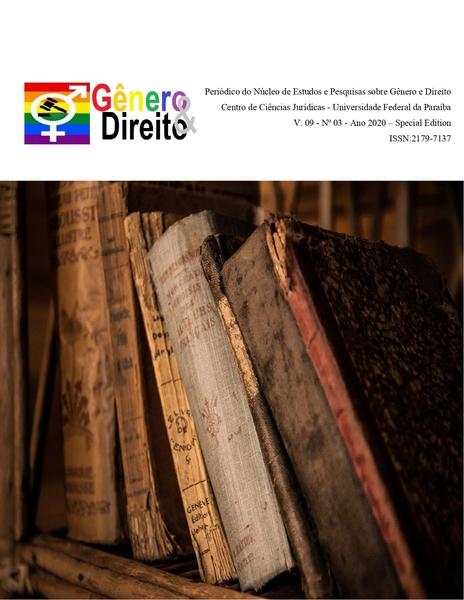THE SYSTEM OF THE STRUCTURE OF LAW COGNITION IN THE MOGERN RUSSIAN THEORY OF LAW AND ITS ROLE IN SOCIETY
Palavras-chave:
legal knowledge, law-cognition structure, legal empiricism, legal intelligence, intellectual and legal will, law-cognition interest.Resumo
the urgency of the issue consists in studying the concept of law cognition and its structuring. The purpose of this article is to develop the concept and structure of legal knowledge. The leading approaches used in the study are: deduction, which assumes that law cognition is the result of mental processing of legal information, as well as induction, which creates the structure of legal knowledge, its constituent elements being legal intelligence, intellectual and legal will, and law-cognition interest. The result of the study is the development of the terms and the basic properties of legal knowledge, legal intelligence, intellectual and legal will, and law-cognition interest. The materials of the article can be useful for professional lawyers, scholars and academics, for their law-cognition activity and the formation of legal awareness.
Downloads
Referências
Alekseev, S.S. (1993). Theory of Law. Moscow: BEK Publishing House.
Anners, E. (1996). The history of Euroean law: Translated from Swedish. Moscow.
Avtonomov, A.S. (1999). Legal political ontology: to the building of a system of categories. Moscow: LLC Infograf.
Baburin, S.N., Berezhnov, A.G., Vorotilin, E.A., et al. (2011). Philosophy of law. Course of lectures: in 2 vols. Ed. by Marchenko. Moscow.
Baranov, V. М., Kruss, V. I. (1999). Legal Hermeneutics and Tasks of Legal Philosophy. Philosophy of Law as an Educational and Scientific Discipline: Materials of the All-Russian Scientific Conference. Rostov-on-Don.
Blachowicz, J. How Science Textbooks Treat Scientific Method: A Philosopher's Perspective 2 (1) : 303–344 JUN 2009: https://doi.org/10.1093/bjps/axp011.
Bogdanova, N.A. (2001). The system of science of constitutional law. Moscow: “Lawyer” publishing house.
Duhem, P. (1976). Physical theory and experiment. Dordrecht-Boston.
Ebzeev, B.S. (1995). Speech at the scientific-practical seminar "The organs of constitutional control of the subjects of the Russian Federation: problems of organization and activity." Bulletin of the Constitutional Court of the Russian Federation. No. 4.
Guilford, J. (1965). Three sides of the intellect. Psychology of thinking. Ed. by A.M. Matyushkin. Moscow.
Hegel, G.W.F. Philosophy of law. Moscow: Mysl, 1990.
Hinkle, Rachael K., Martin, Andrew D., Shaub, J.D., Tiller, Emerson H. A Positive Theory And Empirical Analysis Of Strategic Word Choice In District Court Opinions 4 (2) : 407–444 DEC 2012: https://doi.org/10.1093/jla/las014.
Ikonnikova, G.I., Lyashenko, V.P. (2010). Philosophy of law. Moscow.
Kant, I. Criticism of pure reason. Moscow: Mysl, 1994.
Kelman, M. Moral Realism and the Heuristics Debate. 5 (2): 339–397 DEC 2013. https://doi.org/10.1093/jla/lat004
Kung, G. (1979). Understanding and its rational justification. Dialectic. Vol. 33, fasc. 3-4.
Kutafin, O.E. (2002). Sources of constitutional law in the Russian Federation. Moscow.
Kutafin, O.E. (2000). Speech at the scientific- practical conference “The Place of Theory of State and Law and the History of Political Studies in the System of Higher Legal Education. State and Law. No. 12.
Lageson, S.E. Crime Data, the Internet, and Free Speech: An Evolving Legal Consciousness. 51 (1) : 8-41 MAR 2017. https://doi.org/10.1111/lasr.12253
Lazarev, V.V. (1992). Theory of law and state. Moscow.
Martynenko, P.V. (1987). Comparative constitutional law: textbook. Kiev.
Mikhalkin, N.V., Mikhalkin, A.N. (2011). Philosophy of law. Moscow.
Mishin, A.A. (1984). The principle of separation of powers in the constitutional mechanism of the United States. Moscow.
Mityukov, M. (1998). The Problem of Realizing the Democratic Potential of the Constitution of the Russian Federation. Gaps in the Russian Constitution and the Opportunities for its Improvement. Moscow.
Nado, J. Effects of Moral Cognition of Judgments of Intentionality 4 (1): 709–731 DEC 2008 https://doi.org/10.1093/bjps/axn035
Nersesyants, V.S. (2000). The general theory of law and state. Moscow: NORMA Publishing house.
Perevalov, V.D. (2005). Theory of State and Law: Moscow: Higher education.
Philosophical encyclopedic dictionary. Moscow: INFRA - M, 1997.
Philosophy of Law: Ed. by Danilyan. Moscow, 2005.
Ponomarenko, E.V. Pavlov, A.V. (2007). Modern problems of science. Tyumen: TyumGU Publishing house.
Рорреr, K. (1972). Objective Knowledge: on Evolutionary Approach. Oxford.
Popper, K. (1982). Unended Quest. An Intellectual Autobiography.
Problems of law understanding: A collective monograph on the results of the III Alexeev readings. Ed. by V.D. Perevalov. Yekaterinburg, 2018.
Puchkov, O.A. (2002). Legal anthropology and development of the science of state and law (theoretical foundations). Abstract of dissertation for the Doctor of Law degree. Ekaterinburg.
Radburkh, G. (2004). Philosophy of Law. Moscow.
Rulan, N. (1999). Legal Anthropology. Moscow.
S. Bewley. Legal interest and interference in medical matters. 118 (3) : JAN 2011 https://doi.org/10.1111/j.1471-0528.2010.02814.x
Shafirov, V. M. (2017). Integrative Law Comprehension and Orthodox Positivism. Journal of Russian Law. No. 7.
Shafirov, V. M. (2004). Naturally positive law: an introduction to theory. Krasnoyarsk.
Sinyukov, V.N. (1994). The Russian legal system: Introduction to the general theory. Saratov.
Sociological encyclopedic dictionary. Moscow, 1998.
Syukiyainen, L.R. (1985). Doctrine as a source of Islamic law. Sources of Law. Moscow. P.p 65-83.
Tarasov, N.N. (2001). Methodological problems of legal science. Ekaterinburg.
The general theory of law. Ed. by V.C. Babayev. Nizhny Novgorod: Nizhny Novgorod Higher School of the Ministry of Internal Affairs of the Russian Federation, 1993. P.255.
Trainin, I.O. (1939). On the content and system of state law. Soviet state and law. No. 3.
Tyaglo, A.V., Voropai, T.S. (1999). Critical thinking: The problem of the world education of the XXI century. Kharkiv.
Vanhala, L. Legal Opportunity Structures and the Paradox of Legal Mobilization by the Environmental Movement in the UK. 46 (3) : 523-556 SEPT 2011. https://doi.org/10.1111/j.1540-5893.2012.00505.x
Vengerov, A.B. (1983). The value of archeology and ethnography for legal science. Soviet State and Law. Moscow. No. 3.
Yash Ghai. (1996). Hong Kong: Interpretation of the basic law. Studies in Legal Systems: Mixed and Mixing». Editors. Kluwer Law International. The Hague. London. Boston.

